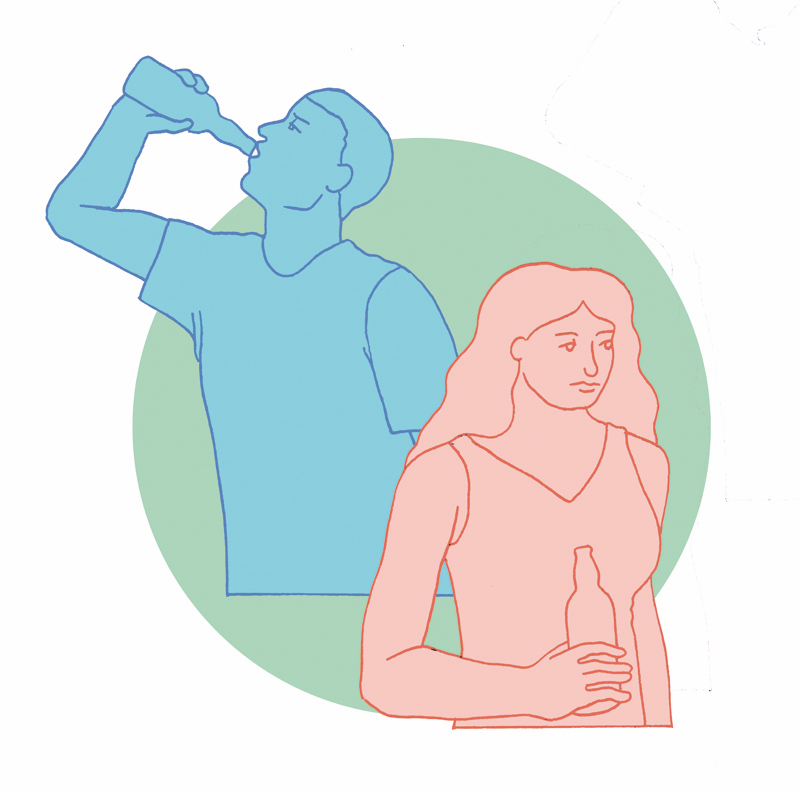Regional campaign in York, Ont., paints an overly simplistic picture of alcohol
You’ve cut the tag off your new black dress, curled your hair, paid your Uber driver and finally got past the bouncers in front of the club. Now, all that’s left to do is wait for “prince charming” to buy you the cosmopolitan you’ve been craving all week.
From song lyrics telling us to be on our worst behaviour to Hollywood blockbusters painting alcohol as the cure to a boring existence, pop culture wants us to believe the best nights of our lives are the ones we don’t remember. Partying is labelled as the defining element
of our youth.
Infatuated by the ideas of only living once and the fear of missing out, it’s no wonder so many of us perform the role of partiers willingly. We must be confident, bold and loose—and not just with each other, but with our drinks too.
According to the Canadian Centre of Substance Abuse, women are generally more vulnerable to the effects of alcohol than men for a variety of reasons, including less overall body weight and more fat tissue.
These facts prompted the regional municipality of York, in southern Ontario, to launch a campaign against binge drinking at the end of August, right before frosh week. While this seems like a good idea, many felt the campaign was inherently sexist.
The campaign’s poster depicts a young woman staring at her cellphone in horror alongside the slogan, “Don’t try to keep up with the guys.” At the bottom of the poster, the line reads: “It’s not just about keeping an eye on your drink, but how much you drink.” While done with good intentions, it is a message that shames, guilts and blames women.
The campaign was heavily criticized for suggesting women are at fault for their own victimization. Emphasizing the idea that women must control their drinking insinuates women can prevent bad things from happening to them so long as they don’t drink too much.
As a young woman, I found the ad problematic but not for the reason it came under fire. Yes, perpetuating the myth that drunk women are “asking for it” is undoubtedly problematic and wrong. Nonetheless, I appreciated that someone at least tried to expose the pressure women feel to live up to binge drinking standards.
What disappointed me about this ad was how it completely failed to communicate that this pressure is not put on us by men, but by the media.
By focusing on sex alone, the ad ignores critical factors which impact a person’s drinking habits—what age they started, how often they drink, if they’re drinking on a full stomach. None of these considerations have anything to do with sex, yet they have everything to do with a person’s susceptibility to alcohol.
Both the media and the York ad campaign paint overly simplistic portrayals of alcohol. Cultural media, like television, music videos and song lyrics, paint binge drinking as an amazing escape. But being drunk doesn’t guarantee that you’ll feel bold or happy. In reality, being drunk triggers different responses, ranging from euphoria to depression. The ad campaign fails to communicate this, and instead paints binge drinking as a problem rooted in biology.
Even from a biological standpoint, though, the ad completely misses the point. I guess its creators forgot that tall women exist. Being 5-10 myself, I can attest to the fact that some women are able to take in more alcohol than “the guys” before ever feeling a thing.
The York campaign is problematic because it assumes that binge drinking is a pressure felt only by women. In reality, binge drinking is a pressure placed on both sexes by media which glamorizes the effects of alcohol. Pop culture places binge drinking on a pedestal. We are taught to praise alcohol for its ability to make us “go with the flow.” What many fail to realize, however, is that the media’s glamorization of alcohol instills pressures on us to behave in gender-specific ways. The stereotypical view perpetuated by mass media is that binge drinking is bold, confident and expected. Saying no is weak, boring and odd. These stereotypes apply whether you are male or female.
I believe the success of a responsible drinking campaign lies in exposing one very simple truth: the media profits off our compliance to gender stereotypes in nightlife culture. It’s up to us to reject the myth that masculinity and femininity are measured by how much you can or can’t drink.
Correction: A previous version of this article incorrectly identified the organization that created the binge drinking campaign. The campaign was launched by the regional municipality of York. The Concordian regrets the error.
Graphic by Alexa Hawksworth




